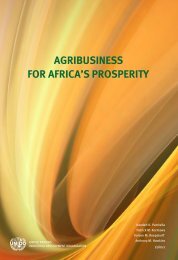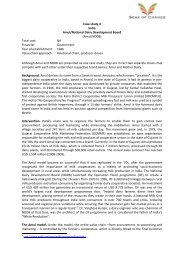Collection of Case Studies 2. - Seas of Change Initiative
Collection of Case Studies 2. - Seas of Change Initiative
Collection of Case Studies 2. - Seas of Change Initiative
Create successful ePaper yourself
Turn your PDF publications into a flip-book with our unique Google optimized e-Paper software.
<strong>2.</strong> Underlying business modelAs a result <strong>of</strong> the collapse <strong>of</strong> cotton sales, farmers in the Collines département tried to increase their income byselling rice to their neighbouring countries in Niger and Nigeria. The border town <strong>of</strong> Malanville, 600 km away, is atransit market for sales to these countries. Local farmers’ groups organize the collection <strong>of</strong> the bags <strong>of</strong> riceamong their members and transport and sales in Malanville. The added value that farmers get there isinsignificant compared with local market prices, particularly once the transport and organisational costs havebeen taken into account. Sales were organized in Malanville for the years 2004 and 2005, but were no longersuccessful from 2006 onwards because the rice from the previous year remained unsold. To gain more insightinto the quality references in the Nigerian region, farmers conducted surveys with salesmen, with larger retailersand customers at the market. They discovered that their rice variety, Beris, did not meet the requirements forpreparing the traditional rice paste. Following this visit, the farmers’ groups started thinking more systematicallyabout consumer preference in the region and the subsequent impact on the choice <strong>of</strong> rice variety andprocessing.Hulling, the main rice processing operation in the area, is performed both manually and mechanically. For manualhulling, producers use a mortar and pestle. This activity is carried out by women, primarily on the rice destinedfor their own consumption. But following the installation <strong>of</strong> several hulling units in, mechanical hulling (afterparboiling) has become well established in the producers’ habits and has taken precedence over the manualprocess. To reduce the rate <strong>of</strong> breakage, processors parboil the rice before hulling. Some women havespecialized in this activity to make rice available at the local markets.Arrangements were made to ensure that all rice farmers would be able to hull their rice using these machines.Lessons learnt from using the two machines were that rice hulling should take the humidity <strong>of</strong> the rice grains intoaccount, and the timing <strong>of</strong> the harvest was therefore very important. Rice that is either too dry or too moistproduces excessive percentages <strong>of</strong> broken grains. Also, the high percentage <strong>of</strong> broken rice is due tosimultaneous hulling <strong>of</strong> different rice varieties with different grain size. And the sales price for bags <strong>of</strong> rice withhomogenous grain size is higher.In 2007, a new rice hulling company was started up in the municipality <strong>of</strong> Savalou by ESOP (Enterprise Serviceaux Organisations des Producteurs). ESOP is a commercial business that processes and sells hulled rice. ESOPensures the transport <strong>of</strong> the paddy stocks bought in each village to their plant. The producers are onlyresponsible for the transport <strong>of</strong> paddy from field to village. It supports producers ensuring a supply <strong>of</strong> rawmaterials at competitive prices, training them in rice-production techniques and facilitating access to seeds andfertilizers. In order to ensure their supply <strong>of</strong> paddy rice from the producers, ESOP introduced contractualcommitments in its partnership with producers. This contract covers the quantity <strong>of</strong> paddy to be delivered byeach producer, the sales’ price, the supply <strong>of</strong> inputs (seed and fertilizer) and production standards. The generalapproach <strong>of</strong> the ESOP programme is to modernise family farming operations by securing market access,targeting local urban markets, and establishing lasting cooperation between producers’ organisations and servicecompanies.The positive impacts <strong>of</strong> the programme for farmers up to 2008 are significant: better prices to farmers andbetter access to inputs for farmers, lower percentages <strong>of</strong> broken rice and fewer impurities. But more needs to bedone to compete with imported Asian rice. The percentage <strong>of</strong> broken rice <strong>of</strong> the local ESOP milling installations isstill relatively high, and volumes that ESOP can process are limited. This is why the Beninese governmentinvested in two large, modern rice processing plants that were built in 2010, <strong>of</strong> which one in the Collinesdépartement. This provides important new perspectives for meeting the quality requirements <strong>of</strong> modern markets.3. Evolution <strong>of</strong> the initiativeIn order to meet European quality requirements, a study was organized to clarify what needed to be improved,and how that could be achieved. Also, the feasibility <strong>of</strong> a Fair Trade label was examined. Another study examinedthe quality preferences <strong>of</strong> consumers in Benin and Niger. On the basis <strong>of</strong> the results <strong>of</strong> these studies, twotechnical field trials were set up. These tests provided greater clarity on the timing <strong>of</strong> planting and harvesting inorder to achieve the desired moisture content. Techniques were also developed for soil erosion control, andappropriate amounts <strong>of</strong> fertilizer and pesticides established. From the results <strong>of</strong> the field trials, productionstandards were established to meet all quality criteria.24







